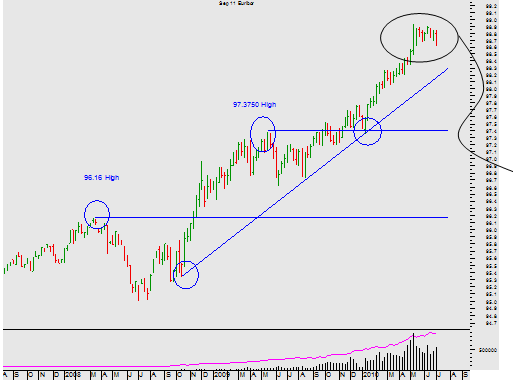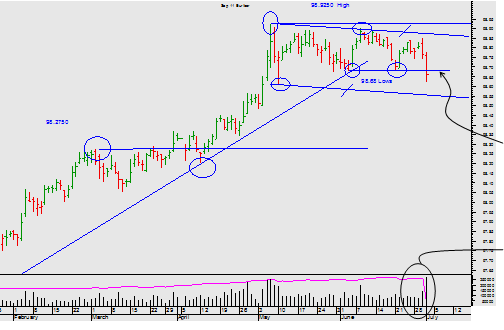Euribor’s Wobble, How Nervous Should We Be?
Interest-Rates / Euro-Zone Jul 02, 2010 - 03:32 AM GMTBy: Seven_Days_Ahead
 Since the beginning of May, Euribor has traded in a clearly defined sideways pattern. Our analysis of this contract had broadly been that it had little room to rally further due to the economic recovery clearly underway, but no reason to turn into a bear market yet since that recovery was still too fragile.
Since the beginning of May, Euribor has traded in a clearly defined sideways pattern. Our analysis of this contract had broadly been that it had little room to rally further due to the economic recovery clearly underway, but no reason to turn into a bear market yet since that recovery was still too fragile.
 |
WEEKLY CHART The market is dithering at the top of a long uptrend. But is it a reversal of the Trend? Look closer. |
|
DAILY CHART The position is less like a Head and Shoulders Reversal than a Multiple Top. The double low of 98.68 is important if there is a confirmed (ie twice) close beneath it. The volume on the sell-off today was significant. But we have seen that sort of volume before – in early May. And, there is a possibility of a large bull flag too, looking at the wider context. So for the moment we are skeptics, until a close is confirmed beneath 98.68. If that happens then the market will be pressured lower. But even then, other things being equal, the diagonal at 98.55 is important… |
The Macro Trader’s view:
Since the beginning of May, Euribor has traded in a clearly defined sideways pattern. Our analysis of this contract had broadly been that it had little room to rally further due to the economic recovery clearly underway, but no reason to turn into a bear market yet since that recovery was still too fragile.
More recently, we judged Euribor remained trapped in a period of sideways trading that could last for a considerable period, as a result of the uncertainty caused by the Euro zone sovereign debt crisis.
Until the crisis morphed from being Greek centric, the Euro zone economy was in recovery mode with Germany pulling the rest along much like a locomotive dragging its trucks. But as the crisis began to engulf additional countries, forcing each in turn to adopt austerity measures, until Germany its self was infected, traders began to fret that growth would be the most conspicuous victim.
Even in the US, after initially sounding reasonably relaxed about the consequences of the Euro zone drama, the Fed now fears the US economy could feel more than just “ripple” effects.
The main problem currently is the Euro zone banking system. It is judged to be heavily over-exposed to the Government bonds of those peripheral Euro zone countries that initially sparked the crisis and have suffered steep sovereign debt downgrades.
Other Banks have become reluctant to lend to Euro zone Banks for fear the money might not be repaid and this has forced the Euro LIBOR rate up, which in turn has begun to feed into the Euribor futures markets.
The problem is serious because those Banks thought to be most at risk are those in Germany and France. Some estimate that the affected banks require large capital injections from the state, or the emergency fund created recently by the EU/EZ/IMF designed to bailout any Euro zone state at risk of default.
So the recent sell off in Euribor that has seen the two month old range break, isn’t so much a market view on the ECB tightening interest rates, but a reflection of tightening conditions in the Wholesale interbank money markets.
We saw these conditions develop earlier during the original financial crisis, but then the Global Banking system was affected; now it is more localized. The ECB is alert to this and continues to provide liquidity as needed despite fears it was about to begin removing some emergency support this week.
So is Euribor turning bearish? We don’t think so, yet.
Mark Sturdy
John Lewis
Seven Days Ahead
Be sure to sign up for and receive these articles automatically at Market Updates
Mark Sturdy, John Lewis & Philip Allwright, write exclusively for Seven Days Ahead a regulated financial advisor selling professional-level technical and macro analysis and high-performing trade recommendations with detailed risk control for banks, hedge funds, and expert private investors around the world. Check out our subscriptions.
© 2010 Copyright Seven Days Ahead - All Rights Reserved
Disclaimer: The above is a matter of opinion provided for general information purposes only and is not intended as investment advice. Information and analysis above are derived from sources and utilising methods believed to be reliable, but we cannot accept responsibility for any losses you may incur as a result of this analysis. Individuals should consult with their personal financial advisors.
Seven Days Ahead Archive |
© 2005-2022 http://www.MarketOracle.co.uk - The Market Oracle is a FREE Daily Financial Markets Analysis & Forecasting online publication.




